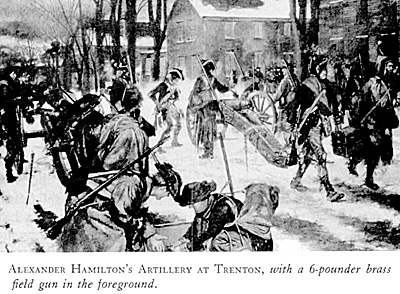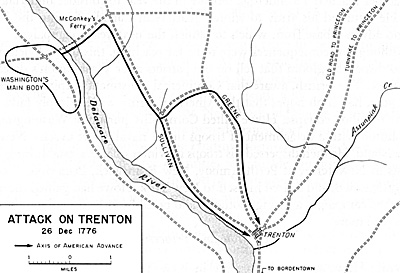 While Howe rested comfortably in New York, Washington desperately sought to reconcentrate his forces and redeem the defeat in New York. General Lee had the misfortune to fall into British hands on December 12, and his 2,000 remaining men then made haste to join Washington. Eight decimated regiments were also pulled from the Northern Army, and with some Pennsylvania militia Washington was able to assemble a force totaling about 7,000 by the last week of December 1776. If he was to use this force, he would have to do so before the enlistments expired on December 31.
While Howe rested comfortably in New York, Washington desperately sought to reconcentrate his forces and redeem the defeat in New York. General Lee had the misfortune to fall into British hands on December 12, and his 2,000 remaining men then made haste to join Washington. Eight decimated regiments were also pulled from the Northern Army, and with some Pennsylvania militia Washington was able to assemble a force totaling about 7,000 by the last week of December 1776. If he was to use this force, he would have to do so before the enlistments expired on December 31.
ALEXANDER HAMILTON's ARTILLERY AT TRENTON, with a 6-pounder brass field gun in the foreground.
With great boldness, Washington formulated a plan to strike by surprise at the Hessian garrisons at Trenton and Bordentown on Christmas night, when the troops might be expected to relax their guard for holiday revelry. A Continental force of 2,400 men under Washington's personal command was to cross the Delaware at McConkey's Ferry above Trenton and then proceed in two columns by different routes, converging on the opposite ends of the main street of Trenton in the early morning of December 26.
A second force, mainly militia, under Col. John Cadwalader was to cross below near Bordentown to attack the Hessian garrison there; a third, also militia, under Brig. Gen. James Ewing, was to cross directly opposite Trenton to block the Hessian route of escape across Assunpink Creek.
Christmas night was cold, windy, and snowy and the Delaware River was filled with blocks of ice. Neither Cadwalader nor Ewing was able to fulfill his part of the plan. Driven on by Washington's indomitable will, the main force did cross as planned and the two columns, commanded respectively by Greene and Sullivan, converged on Trenton at eight o'clock in the morning of December 26, taking the Hessians completely by surprise.
 A New England private noted in his diary for the 26th: "This morning at 4 a clock we set off with our Field pieces and Marched 8 miles to Trenton whare we ware attacked by a Number of Hushing and we Toock 1000 of them besides killed some. Then we marched back and got to the River at Night and got over all the Hushing."
A New England private noted in his diary for the 26th: "This morning at 4 a clock we set off with our Field pieces and Marched 8 miles to Trenton whare we ware attacked by a Number of Hushing and we Toock 1000 of them besides killed some. Then we marched back and got to the River at Night and got over all the Hushing."
This rather undramatic description of a very dramatic event was not far wrong, except in attributing the attack to the "Hushings." The Hessians surrendered after a fight lasting only an hour and a half. Forty were killed and the prisoner count was 918. Only 400 escaped to Bordentown, and these only because Ewing was not in place to block their escape. The Americans lost only 4 dead and 4 wounded.
Encouraged by this success, Washington determined to make another foray. By an impassioned appeal to the patriotism of the men, supplemented by an offer of a $10 bounty in hard money, he was able to persuade at least part of his old army to remain for six more weeks.
With a force of around 5,000 Washington again crossed the Delaware on the night of December 30-31. By this time Cornwallis had hastily gathered together the scattered British garrisons in New Jersey, and took up a position confronting Washington at Trenton on January 2, 1777. Convinced that he had the Americans in a trap, he put off battle until the next day because of the exhausted state of his troops.
In the night Washington slipped away, leaving campfires burning brightly to deceive the British.
The next morning he struck another surprise blow at Princeton, inflicting heavy losses on two British regiments just leaving the town to join Cornwallis. Washington then went into winter quarters in the hills around Morristown, New Jersey. Cornwallis did not pursue. The British had had enough of winter warfare, and Howe drew in his outposts in New Jersey to New Brunswick and Perth Amboy.
Trenton and Princeton not only offset the worst effects of the disastrous defeats in New York but also restored Washington's prestige as a commander with friend and foe alike. In the execution of the two strokes east of the Delaware, Washington had applied the principles of offensive, surprise, and maneuver with great success and finally achieved stature as a military commander.
If these victories did not assure him that he could recruit such an army as Congress had voted, they did at least guarantee that he would be able to field a force the following year. Sir William Howe found that, despite his smashing rout of the Americans in New York, he was left with little more than that city, a foothold in New Jersey, and the port of Newport in Rhode Island.
Back to Table of Contents Issue 2
Back to US Army Military History List of Issues
Back to MagWeb Magazine List
© Copyright 2005 by Coalition Web, Inc.
This article appears in MagWeb.com (Magazine Web) on the Internet World Wide Web.
Other articles from military history and related magazines are available at http://www.magweb.com